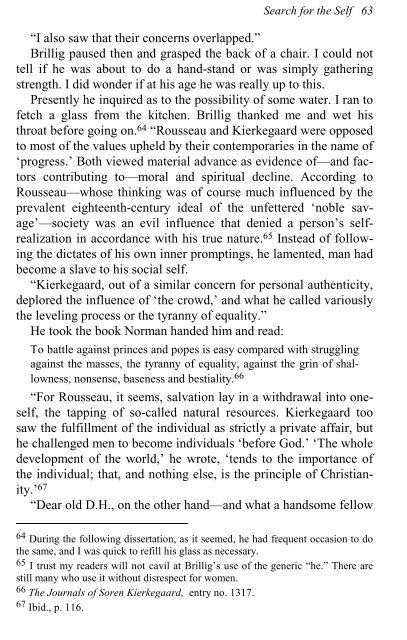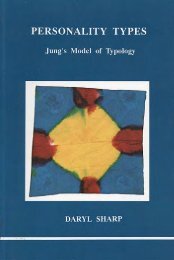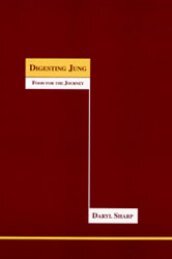Chicken Little: The Inside Story (A Jungian ... - Inner City Books
Chicken Little: The Inside Story (A Jungian ... - Inner City Books
Chicken Little: The Inside Story (A Jungian ... - Inner City Books
You also want an ePaper? Increase the reach of your titles
YUMPU automatically turns print PDFs into web optimized ePapers that Google loves.
Search for the Self 63<br />
“I also saw that their concerns overlapped.”<br />
Brillig paused then and grasped the back of a chair. I could not<br />
tell if he was about to do a hand-stand or was simply gathering<br />
strength. I did wonder if at his age he was really up to this.<br />
Presently he inquired as to the possibility of some water. I ran to<br />
fetch a glass from the kitchen. Brillig thanked me and wet his<br />
throat before going on. 64 “Rousseau and Kierkegaard were opposed<br />
to most of the values upheld by their contemporaries in the name of<br />
‘progress.’ Both viewed material advance as evidence of—and factors<br />
contributing to—moral and spiritual decline. According to<br />
Rousseau—whose thinking was of course much influenced by the<br />
prevalent eighteenth-century ideal of the unfettered ‘noble savage’—society<br />
was an evil influence that denied a person’s selfrealization<br />
in accordance with his true nature. 65 Instead of following<br />
the dictates of his own inner promptings, he lamented, man had<br />
become a slave to his social self.<br />
“Kierkegaard, out of a similar concern for personal authenticity,<br />
deplored the influence of ‘the crowd,’ and what he called variously<br />
the leveling process or the tyranny of equality.”<br />
He took the book Norman handed him and read:<br />
To battle against princes and popes is easy compared with struggling<br />
against the masses, the tyranny of equality, against the grin of shallowness,<br />
nonsense, baseness and bestiality. 66<br />
“For Rousseau, it seems, salvation lay in a withdrawal into oneself,<br />
the tapping of so-called natural resources. Kierkegaard too<br />
saw the fulfillment of the individual as strictly a private affair, but<br />
he challenged men to become individuals ‘before God.’ ‘<strong>The</strong> whole<br />
development of the world,’ he wrote, ‘tends to the importance of<br />
the individual; that, and nothing else, is the principle of Christianity.’<br />
67<br />
“Dear old D.H., on the other hand—and what a handsome fellow<br />
64 During the following dissertation, as it seemed, he had frequent occasion to do<br />
the same, and I was quick to refill his glass as necessary.<br />
65 I trust my readers will not cavil at Brillig’s use of the generic “he.” <strong>The</strong>re are<br />
still many who use it without disrespect for women.<br />
66 <strong>The</strong> Journals of Soren Kierkegaard, entry no. 1317.<br />
67 Ibid., p. 116.










